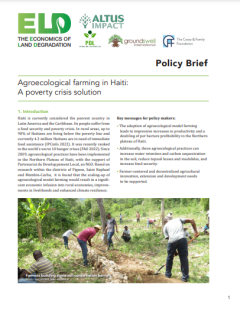
Haiti is considered the poorest country in Latin America and the Caribbean. Its people suffer from a food security and poverty crisis. To help reverse this trend, the scaling-up of agroecological model farming would result in a significant economic infusion into rural economies, improvements in livelihoods and enhanced climate resilience.
This policy brief highlights the challenges Haitians have to face in light of one of the worst hunger crises in history. Examining agroecological production, the brief gives indication to policymakers on how to support farmers in sustainable food production.
It focuses on three communes within northern Haiti that were chosen to assess the role of agroecological farming across different cropping systems (communities either specialized in beans or sugar cane). The brief suggests that farmer-centred and decentralized agricultural innovation, extension and development needs to be supported.
